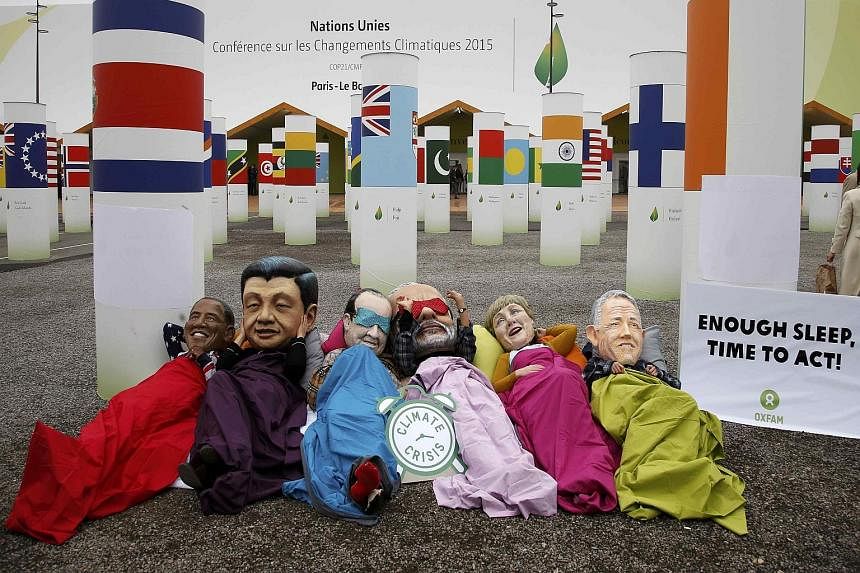Negotiators from nearly 200 nations were racing towards a deadline today to finally seal a global deal to save the planet from weather extremes such as floods, heatwaves and rising seas that threaten millions of people in cities and on islands.
But deep divisions could derail the timeline set by the French government, which is hosting the talks in Paris. As the United Nations-led meeting neared the final hours, age-old divisions that have held back climate negotiations for more than two decades resurfaced as dozens of nations spoke up against a draft text released by the French on Wednesday, many saying it was not ambitious enough.
Negotiators worked through the night on Wednesday to try to bridge differences, and yesterday morning, as tired negotiators returned to the conference centre, French Foreign Minister and president of the talks, Mr Laurent Fabius, said discussions were progressing well and that a new text would be produced to take in all the concerns raised.
"I hope that tomorrow we will have finished," Agence France- Presse quoted him as saying.
The talks are seen as the last chance to agree on a truly global pact in which all nations cut greenhouse emissions quickly to prevent a spike in temperatures that could derail economies, wreck food crops and leave millions homeless, particularly in low-lying island nations.
Major differences include demands for rich nations to step up financing for poorer nations to green their economies and help them adapt to climate change impacts.
Other sticking points are the timeline to quickly ratchet up national climate actions, how best to review them and, crucially, the temperature goal of the pact.
Small island states and poorer African and Asian countries, such as Bangladesh, want the pact to set a limit of 1.5 deg C or below. This is a key measure of the pact's ambition.
"The 1.5 deg C level is the red line that cannot be crossed to guarantee the survival of small island developing states. Any delay will mortgage forever the existence of my country," a senior delegate from Haiti told a marathon plenary session late on Wednesday.
His views echoed those of many other small island and developing states which demanded that the pact be more ambitious and that wealthy nations provide more aid.
Norway called for strong long- term climate goals, strong ambition and strong human rights, a stance echoed by Canada.
Non-governmental organisations were alarmed yesterday that language on human rights protections was stripped from key parts of the draft text. Also missing was a mention of the aviation and shipping industries, which produce about 5 per cent of mankind's greenhouse gas pollution.
Australia voiced disappointment at the weakening of several provisions and wanted an ambitious pact where nations acted together and were not split into groupings such as rich and poor. It is this division that has long bedevilled the talks and driven a nasty blame game of who should take responsibility for cutting emissions and who should pay for it.
A Paris agreement was meant to shift away from this and, in a reflection of the more unified mood, nearly 190 nations submitted climate action plans ahead of the talks. The plans are the foundation for a Paris agreement, or Paris Outcome as the French are calling it.
"We must avoid a situation where, in an effort to reach consensus, we strip the Paris Outcome of its ability to be a genuine step change," said Australia's lead climate negotiator Peter Woolcott.
With time running short, delegates are under immense pressure to reach agreement.
Millions of people are already feeling the effects of climate change and the UN's weather agency said last month that Earth's average temperature increase since pre-industrial times is set to hit 1 deg C this year, underscoring the accelerating warming of the planet.


